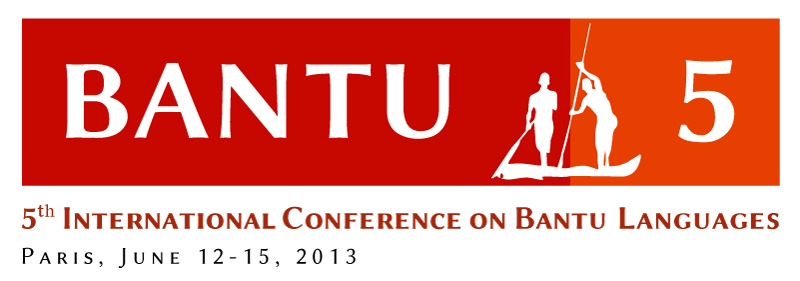
WS2: The construal of tense and aspect in BantuWorkshop 2: The construal of tense and aspect in Bantu Convenors
Axel Fleisch (University of Helsinki) Robert Botne (Indiana University, Bloomington) Description The complexity of grammaticalised tense and aspect (TA) categories as well as modality in the verbal morphology of Bantu languages has long been noted as a challenge both in theoretical terms and with regard to adequate language-specific descriptions/analyses of verbal morphological markers (for a recent overview, see Nurse 2008). Among notions of crucial relevance for many Bantu languages are temporal remoteness distinctions and the interaction of lexical aspect with grammatical TA categories. Over recent years, a cognitive linguistic model has been proposed which provides a principled theoretical account of these categories (Botne and Kershner 2008; Botne 2012). It has been developed on the basis of several languages (including among others Chindali, Chisukwa, Zulu), and has since informed several Bantu language descriptions (e.g. Seidel 2008, Crane 2011). The central assumption of these proposals is that the cognitive construal of situation types (states, changes-of-states, etc.) and temporality are of utmost importance for the analysis of Bantu TA categories. With regard to temporality, one needs to distinguish between different ways of viewing time (e.g. ‘ego moving in time’ v. ‘time moving’, either with, or past ego). These distinct construals of time can be targeted separately by different subsets of conventionalised grammatical TA markers. The closely intertwined empirical and theoretical work has led to a model which is sufficiently mature to extend its application to a broader range of languages and phenomena, which is what we intend to achieve with this workshop. Departing from the initial interest—more adequate synchronic analyses of TA systems in Bantu languages— the model has crystallized to the extent that we can now address further questions and expand in different directions. The workshop, then, will seek to address two general themes:
In order to address these questions, we welcome papers contributing insight on Bantu languages, but also on other languages related to Bantu, either by way of contact or genetic family ties. In order to have focussed and fruitful discussions, we expect participants to provide a written draft of their contribution by May 15th so that the workshop participants can familiarize themselves with each other’s work ahead of our Bantu 5 pre-conference workshop. The position paper based on Botne and Kershner (2008) and Botne (2012) can be downloaded here. It is important to us that participants engage critically with the model(s) and proposals made in this position paper. It contains a concise description of the conceptual tools underlying our model, but it also raises some controversial points, “loose ends” and challenges that still need to be addressed. The aim of the position paper is to ensure a productive interaction at the workshop. References: Botne, Robert 2012. Remoteness distinctions. In Robert I. Binnick (ed.), The Oxford Handbook of Tense and Aspect, 536-562. Oxford: Oxford University Press.Botne, Robert & Tiffany L. Kershner 2008. Tense and cognitive space: On the organization of tense/aspect systems in Bantu languages and beyond. Cognitive Linguistics 19(2). 145 218. Crane, Thera Marie 2011. "Completion" semantics in Totela tense and aspect. Presentation 9 April 2011. B4ntu Conference. Berlin. (http://www2.hu-berlin.de/b4ntu/wp-content/uploads/B4ntu-Crane.pdf) Seidel, Frank 2008. A Grammar of Yeyi. A Bantu Language of Southern Africa. Cologne: Köppe. |

